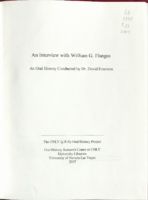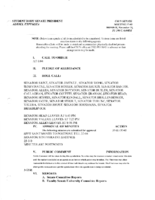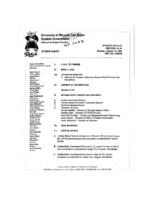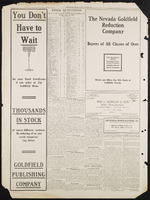Search the Special Collections and Archives Portal
Search Results
Toni and Wilbur Clark Photographs
Identifier
Abstract
The Toni and Wilbur Clark Photographs depict Las Vegas, Nevada casino owner and land developer Wilbur Clark and his wife Toni from 1910 to 1975. The photographs primarily document Wilbur and Toni Clark at the Desert Inn, the hotel and casino Wilbur co-owned. The photographs also depict him with politicians and entertainers, and Wilbur and Toni Clark’s house in Las Vegas.
Archival Collection
Edith Giles Barcus Family Photograph Collection
Identifier
Abstract
The Edith Giles Barcus Family Photograph Collection (approximately 1878-1954) consists of black-and-white photographic prints and negatives, as well as postcards and photograph albums. The images depict locations in Nevada including Las Vegas, Goldfield, Searchlight, and Tonopah, in addition to locations in Arizona, California, Colorado, Massachusetts, Utah, and Mexico. Also included are images of family, friends, and associates of the Giles Barcus family. The albums contain photographs depicting the Giles family as they traveled through the southwest United States and Mexico, as well as postcards from prominent locations in the southwestern United States.
Archival Collection
Margo Mansergh Papers
Identifier
Abstract
The Margo Mansergh Papers (approximately 1920-2010) document the life of former showgirl and dancer Margaret "Margo" Mansergh Tomaszewski. Materials include photographs of Margo modeling, backstage at various shows, portraits, and personal family photographs as well as programs from her international career performing in the Lido de Paris and Pigalle Nightclub in London, as well as a number of shows in Las Vegas, Nevada, such as Vive Les Girls, Casino de Paris, Minsky's Burlesque, and Lido de Paris at the Stardust. The collection contains materials from Mansergh's modeling career, including photographs, book covers, and images of her as an extra in films. Digital images from the closing Stardust performance and an event for Miss Bluebell are also found in the collection.
Archival Collection

Meeting minutes for Consolidated Student Senate University of Nevada, Las Vegas, Febuary 14, 1985
Date
Archival Collection
Description
Text

Transcript of interview with William G. Flangas by Dr. David Emerson, September 27, 2006
Date
Archival Collection
Description
Text

Meeting minutes for Consolidated Student Senate, University of Nevada, Las Vegas, November 13, 2006
Date
Archival Collection
Description
Text

Meeting minutes for Consolidated Student Senate, University of Nevada, Las Vegas, January 29, 2001
Date
Archival Collection
Description
Text

Transcript of interview with Billy Paul Smith by Claytee White, October 3, 2013
Date
Archival Collection
Description
Chemist, mathematician, and health physicist Billy Paul Smith donates time to tutor young people in hopes of attracting more youth into the fields of math and science. Born in 1942 and schooled in segregated black schools in Shreveport, Louisiana, and Texarkana, Texas, he graduated from high school at age fifteen and enrolled at Prairie View A&M University, where he trained with the Reserve Officer Training Corps (ROTC) and earned his Bachelor’s degree in chemistry and in 1964 his Master’s degrees in chemistry and math. Most young U.S. Army officers in 1964 went to Vietnam, but Billy’s math and science background steered him to the Army Chemical Corps, where he was quickly selected to join a new team. The team was to develop responses to nuclear weapon accidents and worked under the Defense Atomic Support Agency (DASA) in Albuquerque, New Mexico. At the same time, Billy completed the Weapons Ordinance Army course on classified information relating to the U.S. nuclear weapons arsenal. In this interview, Billy talks about his service with DASA and his subsequent twenty-seven years working at the Nevada Test Site in a variety of positions with Reynolds Electrical and Engineering Company, Inc. (REECo), a company that had “percentagewise more blacks in management positions than any other [Las Vegas] company.” He experienced the quiet racism of Las Vegas residential segregation when he tried to purchase a house in a neighborhood he liked and the unexpected kindness of the REECo general manager, Ron Keen, who made sure the Smith family could live where they wanted to live. He talks about Area 51 and explains underground testing activity and offers the scientific and ecological reasons why scientists deemed Yucca Mountain safe to store nuclear waste. After retiring at fifty-two, Billy and a colleague formed an independent instrumentation company, which, from 1995–2005 provided and calibrated radiological measurement and detection instruments for the decommissioning and closure of the Rocky Flats nuclear plant in Golden, Colorado. During that time, Billy rented an apartment in Boulder, but he and Jackie maintained their Las Vegas home, where they still reside. Billy shares memories of places he and his wife used to enjoy on the Westside and tells of their longtime friends in the black community. He also talks about developing his philosophy of philanthropy through Alpha Phi Alpha Fraternity and discusses becoming a member of the Knowledge Fund Advisory Council for the Governor’s Office of Economic Development (GOED) and the advisory council for the Nevada System of Higher Education.
Text

Transcript of interview with Dennis Ortwein by Claytee White, May 6, 2009
Date
Archival Collection
Description
Dennis Ortwein arrived in Las Vegas in 1956. He shares many details about growing up in Montana, his parents and siblings, his education, and the moment in time when he was offered an opportunity to work in Las Vegas. He also lays out the path his singing career took, starting with school plays, duets with his sister, and high school quartets. Once in Las Vegas, Dennis taught for a while, served as principal, and was involved in creating programs that helped integrate schools. He also talks about his church choir work, entertainment in early Las Vegas, above-ground testing at the Nevada Test Site, and anti-nuclear protests. Dennis served as lab school and student teaching coordinator in Nigeria. He offers several anecdotes and stories about the time he and his family spent there. After retiring early (age 53), Dennis acted as consultant to the Esmeralda County school board, executive director for the National Conference of Christians and Jews, and wrote a book. He is currently enjoying his singing career by appearing at conventions, in musicals, and at weddings and memorials.
Text

